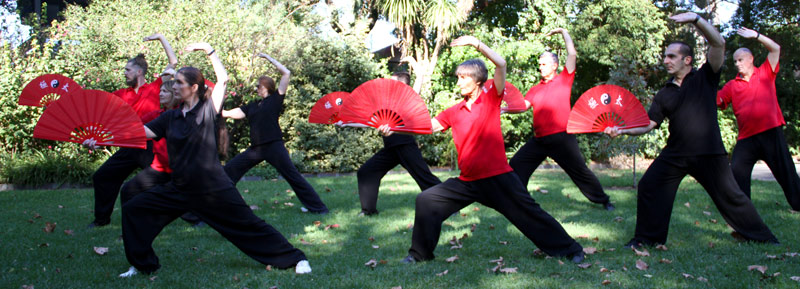What is Tai Chi?

Tai Chi (Taijiquan in Chinese meaning “Supreme Ultimate Fist”) is literally an internal Chinese Martial Art that has been practiced in China for both its self-defence training and health benefits since the 16th Century.
Although it is a branch of the Chinese Martial Arts (Wushu), today it is predominately practiced for wellbeing including the prevention or improvement of illness and disease, and the stresses and strains of modern living. Taijiquan training usually involves several elements including Neigong (內功; breathing exercises, meditation and internal skills), Taolu (套路; forms training with both weapons and bare-hand), Sanshou (散打; self-defence techniques), and Tuishou (推手; Push Hands). Due to its diverse history, there are a multitude of training forms and practices, both traditional and modern. However, there are seven accepted styles of Tai Chi in the modern lexicon. They are Chen, Yang, Wu, Wu (Hao), Sun, He and Dong Yue. Yang style is the most popular style and the one you are most likely to have seen being practiced for health and wellbeing.
The study of Taijiquan comprises three key aspects:
Health
The slow and gentle movements promote harmony in mind and body, thereby improving mobility, suppleness and mental alertness. There are many positive studies linking the practice of Taijiquan to improvements in sufferers of heart disease, diabetes, arthritis, asthma, stroke, ADHD and depression, to name a few.
Meditation
The focus and calmness cultivated by the practice of Taijiquan creates a meditative state that reduces stress, thereby leading to improved immune system function and homeostasis in the body. It has also been seen to improve concentration and memory function in many practitioners.
Martial Art
The ability to see Taijiquan as a martial art test’s the practitioner’s self-awareness and self-respect. It leads to improvements in human relationships and an improved response to outside forces.
In summary, with a good taijiquan instructor, you should be able to develop inner quietness, mental focus, physical relaxation, general health improvement, muscular control and self-discipline. The gentle low impact nature of Tai Chi means it is suitable for all age groups and fitness levels. It is the one form of exercise that can be practiced and studied well in to old age.
Recent Posts
- Qigong: A Guide to Understanding the Many Paths of Energy Cultivation
- The Year of the Wood Snake and Tai Chi/Qigong: A Harmonious Interplay
- An Introduction to the Six Harmonies in Taijiquan
- Tai Chi Lessons from a Broken Piano: Work with What You Have
- Tai Chi and Cage Fighting: Zhang WeiLi, China’s UFC Champion
- Studio 14 - The Launch of a Dream
- It’s The Year of the Wood Dragon – A Great Time to Dream Big
- The 21st WTQA Festival 2023 - My First Wushu Tai Chi Qigong Festival
- Spreading the Word: Presenting the Benefits of Qigong and Tai Chi to Probus Members
- Fortune, Sex, and a Good Death: The Bat in Chinese Symbology
Tags
Archive
- March 2025 (1)
- January 2025 (1)
- November 2024 (1)
- September 2024 (1)
- July 2024 (1)
- January 2024 (2)
- December 2023 (1)
- September 2023 (1)
- June 2023 (2)
- April 2023 (1)
- January 2023 (2)
- November 2022 (1)
- August 2022 (1)
- March 2022 (1)
- January 2022 (2)
- September 2021 (1)
- May 2021 (1)
- March 2021 (1)
- February 2021 (2)
- January 2021 (1)
- December 2020 (1)
- August 2020 (1)
- April 2020 (1)
- January 2020 (1)
- October 2019 (1)
- May 2019 (2)
- April 2019 (1)
- March 2019 (3)
- February 2019 (2)
- January 2019 (3)
- December 2018 (2)
- October 2018 (1)
- July 2018 (1)
- June 2018 (1)
- April 2018 (2)
- February 2018 (1)
- October 2017 (1)
- September 2017 (1)
- April 2017 (2)
- March 2017 (1)
- January 2017 (2)
- December 2016 (2)
- October 2016 (1)
- September 2016 (1)
- August 2016 (1)
- July 2016 (2)
- June 2016 (21)
